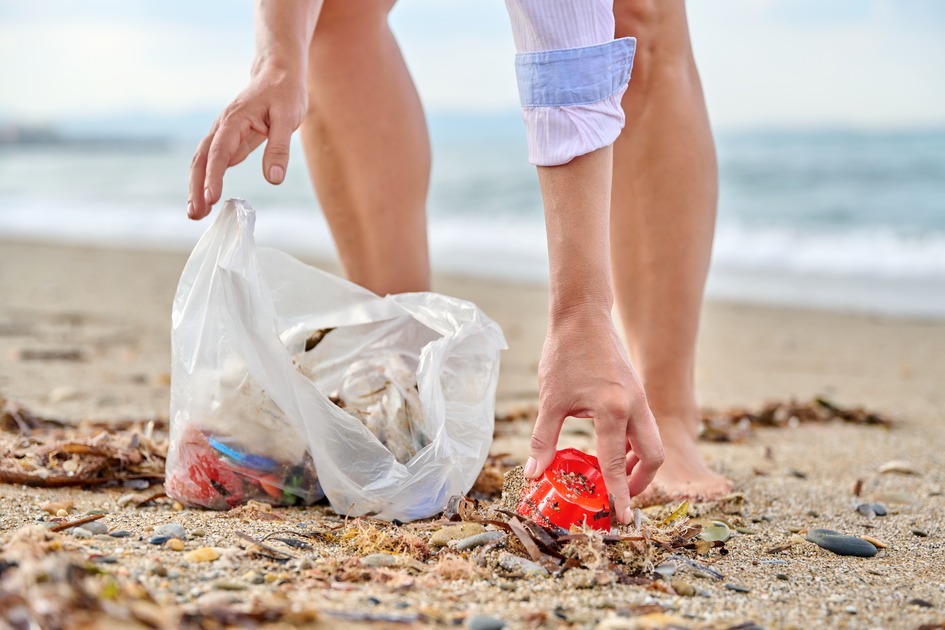Plastic waste is choking our planet. Each year 400 million metric tons of plastic are produced globally, yet only about 9% is recycled. An estimated 10 million tons of plastic flood into our oceans annually undp.org, threatening wildlife and littering beaches. In response, many nations are taking bold action. Here we spotlight five countries pioneering ambitious plastic bans – and how their approaches blend policy, community action, and innovation. (Spoiler: Their successes will inspire you to tackle plastic waste in your own life.)
Rwanda: Africa’s Plastic-Free Trailblazer
A volunteer participates in a beach cleanup, retrieving plastic waste from coastal vegetation to protect local ecosystems.
Rwanda was one of the first countries to ban single-use plastic bags back in 2008. Today, arriving in Kigali with a plastic bag might get it confiscated at the airport – a small price for what’s now hailed as “the cleanest city in Africa”earthday.org. In 2019, Rwanda expanded its ban to include all single-use plastics like bottles, straws, and packaging. The results speak volumes: streets once clogged with litter are now virtually spotless, thanks in part to a unique community program. On the last Saturday of every month, all Rwandans aged 16 to 65 join Umuganda, a nationwide day of community service often devoted to cleanup projects. This blend of strong policy and grassroots action has made Rwanda a model for the region. In fact, neighboring Kenya followed suit with its own tough bag ban in 2017, including fines and even jail time for violators. Rwanda’s journey shows that when a nation pairs political will with citizen buy-in, a plastic-free revolution can truly take hold.
France: Pioneering Plastic-Free Shopping
France has taken its environmental passion to the produce aisle. In 2022, the French government enacted a groundbreaking law banning plastic packaging on 30 types of fruits and vegetables. No more shrink-wrapped cucumbers or bagged oranges – many items now come completely plastic-free, embracing nature’s own “packaging” (peels and skins). Even those tiny produce stickers must be made of compostable material under the new rules earthday.org. This move was an extension of France’s leadership in Europe: it was one of the first EU countries to ban single-use plastic plates, cups, and cutlery (as early as 2020). By eliminating needless plastic at the source, France is sparing landfills and oceans from tons of waste. The policy also gives a boost to plastic-free product innovation – from compostable stickers to new biodegradable packaging materials. Pro Tip: Take inspiration next time you shop – bring your own reusable produce bags or choose loose items. You’ll support the plastic-free movement, just like the French!
Australia: Uniting States and Shoppers Against Plastic
Down under, Australia is proving that a federated country can rally together to curb plastic pollution. Over the past few years, all Australian states and territories enacted bans on certain single-use plastics – from lightweight checkout bags to straws – although the specifics vary. The impact has been dramatic. In Queensland, for example, a plastic bag ban led to a 70% drop in plastic bag litter within one year. Even big business joined the cause: in 2018, Australia’s two largest supermarket chains, Coles and Woolworths, voluntarily stopped offering single-use plastic bags, nudging millions of shoppers to bring reusables. This corporate action alone slashed nationwide plastic bag consumption by 80%. It turns out Aussies were ready for it – the vast majority express deep concern about plastic pollution earthday.org. The Australian example highlights the power of popular support and private-sector initiative alongside lawmaking. When citizens, companies, and local governments get on the same page, a culture shift toward reusable bags and containers can happen almost overnight. Quick Win: Build your own “zero-plastic kit” like many Australians have – include a sturdy tote bag, a metal water bottle, and reusable straws. Keep it by your door so you’re always ready to shop plastic-free!
Chile: Bold Bans to Protect Oceans
Chile has emerged as Latin America’s plastic ban pioneer. It started by outlawing retail plastic bags in 2018 (a regional first), and then upped the ante with a sweeping Single-Use Plastics Law in 2022 earthday.org. This law targets plastic cups, cutlery, stirrers, straws, and takeout containers, with a phased plan to eliminate most single-use plastics from the food industry over three years. Why such urgency? Chile’s geography – a 2,600-mile coastline – means plastic waste is not just an eyesore but a direct threat to marine life. In fact, roughly 70% of beach litter worldwide consists of single-use plastics. Chile’s government recognized that banning these items at home could dramatically reduce the plastic washing up on its shores. The new rules have teeth: restaurants must switch to reusable or compostable service ware, and supermarkets have introduced refill stations and paper packaging alternatives. Chile’s holistic approach balances environmental ambition with practical transition periods for businesses. Already, coastal communities are reporting cleaner beaches. By tackling the plastics crisis head-on, Chile is safeguarding its oceans and inspiring other countries across the Americas to ride the same wave of change. Beach cleanup groups cheer this victory – fewer disposable plastics in circulation means fewer evenings spent picking them out of the sand!
Canada: Policy, Persistence, and a Plastic-Free Future
Canada is proving that even in a country with powerful industry players, determined policy can prevail – with a little persistence. In 2021, Canada made a bold move by designating plastic as a “toxic” substance under its environmental protection laws. This label gave the federal government the authority to roll out a nationwide plastics ban. Soon after, Canada announced a gradual phase-out of common single-use plastics: shopping bags, straws, stir sticks, six-pack rings, plastic cutlery, and takeout boxes are all on the chopping block earthday.org. By the end of 2023, you’d be hard-pressed to find these items at Canadian stores – reusable bags and paper straws are the new norm. This policy could eliminate billions of pieces of plastic waste. However, the journey hasn’t been without hurdles. A coalition of major chemical and oil companies challenged the “toxic” designation in court, aiming to stall or overturn the ban. The good news? Canada isn’t backing down – the government has appealed, and the regulations remain in effect. In the meantime, Canadians are adapting enthusiastically. Streets and parks are already seeing less litter as the ban takes hold. Canada’s fight illustrates an important lesson: strong environmental policies can be achieved in the face of opposition, but it takes public support and steadfast leadership. As Canada stays the course, it’s on track to fulfill a vision of zero plastic waste by 2030, setting a powerful example for larger economies (looking at you, United States!).
The Global Movement & How You Can Join
From Africa to Europe, Oceania to the Americas, these five countries are leading a global revolution against plastic pollution. Their approaches may differ – Rwanda rallies community clean-ups, France legislates plastic-free products, Australia unites public and private action, Chile targets ocean-bound litter, and Canada pushes bold federal policies – but all share a common thread: the courage to change old habits for a greener future. These trailblazers have sparked a ripple effect, with over 60 nations now banning or taxing single-use plastics in some form globalcitizen.org. The message is clear: when governments and citizens work together, plastic pollution is a problem we can solve.
Now it’s your turn. You don’t have to wait for a law to reduce your own plastic footprint. Start small and be the change in your daily life:
- Bring Your Own Bags & Bottles: Keep reusable bags in your car or backpack so you’re always “reusable ready.” Ditto for a refillable water bottle and coffee cup – these simple habits cut out countless throwaway items.
- Say No to Single-Use: Skip plastic straws and utensils (carry a metal straw or a spork if you like). Opt for products with minimal or no plastic packaging – many stores offer cardboard, glass, or bulk options now.
- Get Involved: Join a local beach or park cleanup. It’s a fantastic workout and a way to meet like-minded eco-warriors. Pro Tip: Make it fun – bring friends and turn it into a fitness challenge or storytelling session. As we say at ArmyGymnastics, “Movement is storytelling” – and each piece of trash you pick up tells the story of a cleaner planet.
The plastic ban revolution is underway – and you can be part of it. Whether by supporting policies in your community or making plastic-free swaps at home, your actions matter. Let the success of these five countries ignite your motivation. The next time you step out for errands, grab that tote bag and be a force for change. Together, we can turn the tide on plastic pollution, one reusable bag, one straw, one beach at a time. Start your plastic-free journey today – our planet will thank you!











